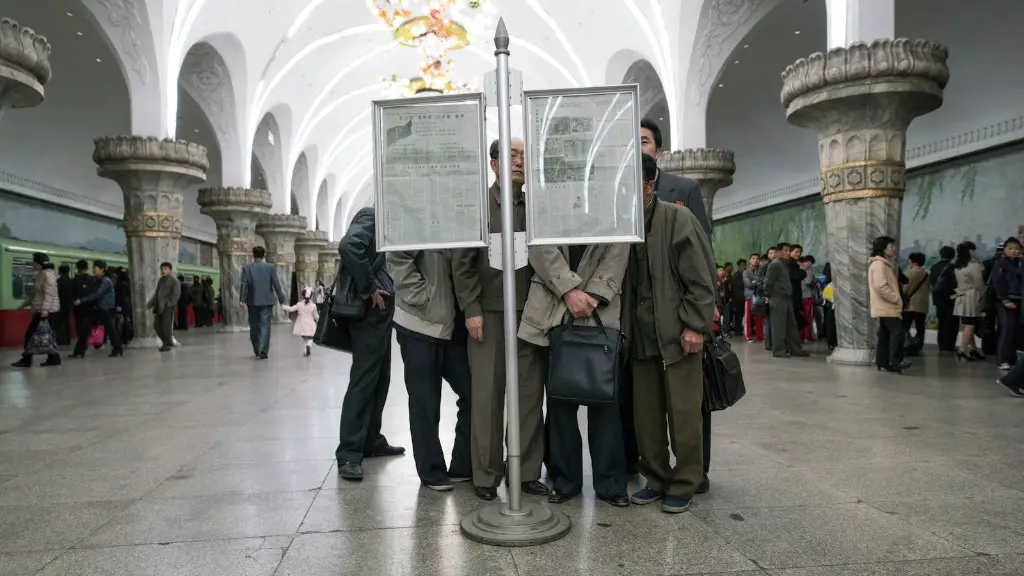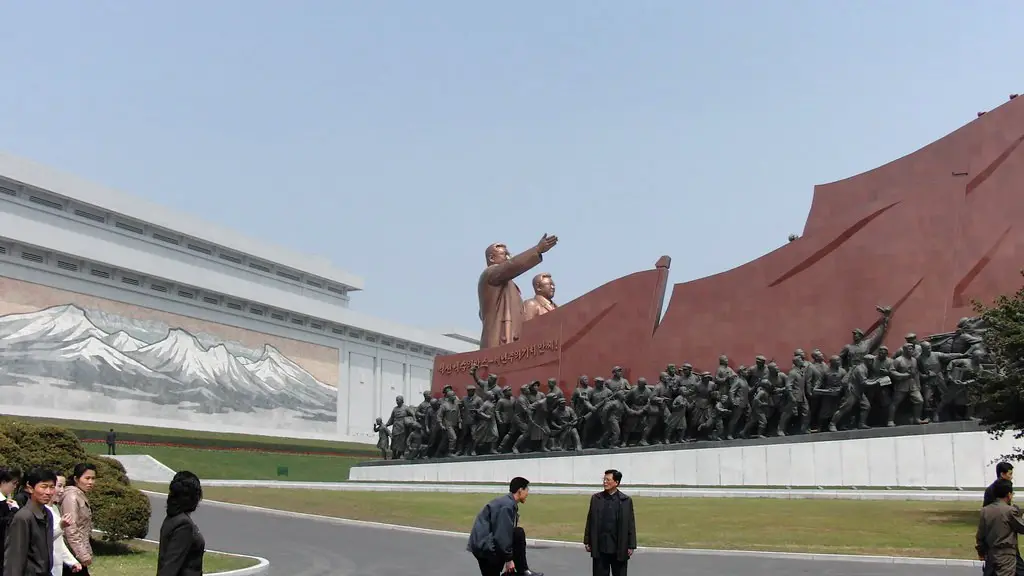Why Is China Allied With North Korea?
The relationship between China and North Korea is complex, with many objectives and goals, both old and new. The connection between the two nations dates back in time and although it has evolved over the years, the alliance has endured and remains relevant today. While North Korea continues to be a source of regional instability, China is simultaneously both one of its closest allies and most powerful critics.
In the post-World War II era, the alliance between China and North Korea was formed in mutual distrust of the United States and Soviet Union. After the establishment of diplomatic relations in 1948, the two countries shared a common ideology of independence from the superpowers. China had provided economic support, military aid, and diplomatic protection and recognition to North Korea since its establishment and has continued to be its main diplomatic partner on the international stage. Thus, the alliance has endured for many generations.
Economically, China has become increasingly important to North Korea since the 1990s. Following the collapse of the Soviet Union, North Korea fell into severe economic decline and China was one of the few countries that offered assistance. Through large loans and investments, China provided financial support and technological assistance to help North Korea cope with the economic crisis. This close economic relationship has continued to be important, as evidenced by increased trade between the two countries.
Beyond economics, there are also strategic reasons why China is aligned with North Korea. For one, North Korea serves as a buffer zone between China and its rival, South Korea. North Korea also functions as a deterrent against military encroachments into the region. By supporting North Korea, China is able to project its power and influence in the region, which it views as a priority for preserving its sovereignty and stability. Additionally, there are some strategic advantages to having North Korea as an ally, such as access to ports and waterways.
It is important to note that the relationship between China and North Korea has not always been smooth. In recent years, China has become increasingly frustrated with North Korea’s isolationist policy and provocations. China has a growing interest in modernizing the region, and it does not want to be associated with regimes that do not share its vision for development. As a result, China has become increasingly vocal in its criticism of North Korea, often urging it to pursue reforms and open up to the outside world.
As North Korea continues to be a source of regional instability and a serious threat to peace and security, the importance of the Chinese-North Korean relationship cannot be underestimated. Although North Korea remains the focus of criticism and condemnation from the international community, it is clear that China is unlikely to change its position on North Korea anytime soon.
How is China Helping North Korea Economically?
China has been a major source of economic assistance for North Korea over the past decades, providing loans and investments, technological support and other economic assistance. To date, China is the largest trading partner of North Korea, making up an estimated 85% of Pyongyang’s total trade. This close economic relationship has been invaluable in helping North Korea maintain economic stability and sovereign control over its economy. Despite international sanctions, trade between the two countries continues to grow.
On top of trade and tourism, China has provided monetary support to North Korea. Following the collapse of the Soviet Union in the 1990s, China provided large loans and investments to help North Korea cope with the economic crisis. China has continued to provide monetary support, and in recent years, foreign aid and investment has increased significantly. For example, in 2018, China provided North Korea with $25 million in economic aid. This economic support from China has been instrumental in helping North Korea survive economic hardship and alleviate poverty.
Moreover, China has also provided technological support to North Korea, helping them develop their own science, technology and defense capabilities. For example, China provided technology such as five-axis milling to North Korea so that it might produce more sophisticated nuclear weapons capabilities. Additionally, China has also provided access to sensitive maritime technology and software that is critical for North Korea’s military and intelligence operations.
In spite of international sanctions, North Korea has been able to rely on China to maintain its economy. China’s willingness to engage in trade with North Korea despite criticism is indicative of the strength of the alliance between the two countries.
What are the Strategic Reasons for China Allying with North Korea?
Beyond economics, there are also several strategic reasons why China is allied with North Korea. To begin with, North Korea serves as a buffer zone between China and its rival, South Korea. Since a divided Korean Peninsula threatens China’s security and stability, it has been paramount for China to maintain a relationship with North Korea. Additionally, having North Korea as an ally also gives China some strategic advantages, such as access to ports and waterways. This access directly affects China’s regional hegemony and ability to access the global market.
Moreover, it is important to note that North Korea’s nuclear weapons also become important strategically from China’s point of view. North Korea’s nuclear weapons program serves as a distraction to the U.S. and its allies, while simultaneously serving as a counterweight to U.S. forces in the region. The presence of North Korean nuclear weapons also makes it more difficult for the U.S. to wage a war in the region. As such, North Korea’s nuclear weapons program contributes to China’s long-term strategic goals in the region.
Overall, it is clear that North Korea’s strategic importance to China cannot be overstated. In addition to providing economic aid and technological assistance, North Korea also serves as a valuable strategic partner for China, helping it in achieving its long-term goals in the region. As such, it is likely that the alliance between China and North Korea will continue to endure in the years to come.
How Has The Relationship Evolved Over The Years?
While the alliance between China and North Korea has endured for many years in spite of regional conflicts and international sanctions, it is important to note that the relationship has evolved over time. In the past, the alliance between the two countries was based on mutual distrust of the United States and Soviet Union. But today, it is based primarily on economic and strategic interests. This shift in focus has been reflected in the types of assistance China has provided North Korea in recent years–from providing large loans and investments to providing technological support and access to ports and waterways.
In addition to the shift in focus, the relationship between China and North Korea has also changed in other ways. As China’s position has become increasingly influential in the region, it has taken a more critical role in North Korea’s politics. For example, in recent years, China has urged North Korea to pursue reforms and open up to the outside world, a departure from the total support it had previously offered. Furthermore, China has also been more vocal in its criticism of North Korea, condemning its ballistic missile launches and other provocations.
These changes show that the relationship between China and North Korea has evolved over the years, from one based on ideology and mutual distrust to one based on economic and strategic interests. Nevertheless, the alliance between the two countries has endured and remains relevant today.
What are the Challenges Faced by The Alliance?
Despite the strong alliance between China and North Korea, there are a number of challenges the two countries face. To begin with, the two countries have conflicting visions for the region. China wants to modernize and develop the region while North Korea is resistant to outside influence and has an isolationist policy. As a result, there is an inherent tension between the two countries and this could be a major challenge for the alliance in the future.
Moreover, economic sanctions from the international community have put pressure on both countries, especially North Korea. The economic sanctions have significantly reduced trade between China and North Korea, limiting the economic support China is able to provide. Furthermore, the sanctions have also made it difficult for China to access the resources and ports it needs in the region.
In addition to economic challenges, North Korea’s pursuit of nuclear weapons has been a major source of tension between the two countries. While North Korea sees its nuclear program as a deterrent against hostile external forces, China sees the program as a threat to regional security and stability. As such, China often publicly criticizes North Korea’s nuclear program and has urged it to pursue reforms and moderation.
What are The Implications of China and North Korea’s Alliance?
The strong and enduring alliance between China and North Korea has implications for regional security and stability. To begin with, China’s economic, technological and political support for North Korea allows it to maintain sovereign control over its economy and political system, despite international sanctions and regional pressures. Furthermore, the alliance between China and North Korea serves to protect both countries from hostile external forces and acts as a deterrent against military encroachments into the region.
Moreover, the alliance serves to give China a powerful presence in the region, allowing it to project its influence in the international arena and shape regional conversations. North Korea’s nuclear weapons also give China leverage against the United States and its allies, making it more difficult for the U.S. to wage a war in the region. As such, it is clear that the alliance between China and North Korea is an important factor in regional security and stability.
Finally, it is important to note that the alliance between China and North Korea is not without its drawbacks. The presence of North Korea reduces the possibility of dialogue between the two Koreas, which could potentially lead to peace and reconciliation. Furthermore, the economic and political support offered by China potentially props up oppressive regimes, limiting the ability of citizens to achieve economic and political freedom.





